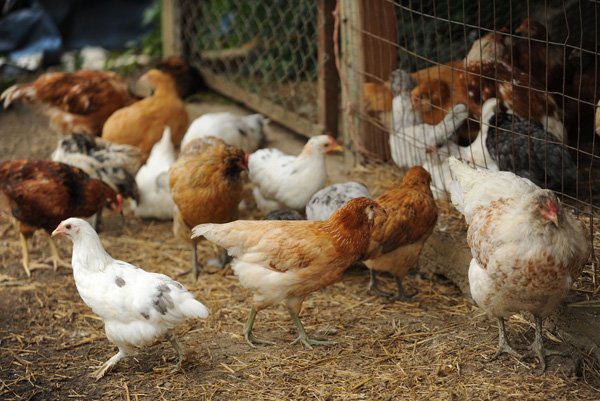FAYETTEVILLE — Goats, bees and more chickens and ducks will be allowed in residential areas if changes to city code clear the Planning Commission on Monday and the City Council early next year.
The changes would also make it easier for urban farmers and backyard gardeners to sell produce from their homes.
Meeting Information
Fayetteville Planning Commission
When: 5:30 p.m. Monday
Where: Room 219, City Administration Building, 113 W. Mountain St.
On the Agenda: A set of ordinance changes aimed at promoting urban agriculture
Aldermen after months of discussion approved the city’s animals and fowl ordinance in 2008. The law allows homeowners to raise up to four hens in their side or backyards. Roosters and other farm animals, including horses, cows, pigs and sheep aren’t permitted in non-agricultural zones.
The proposal — developed after months of staff review and input from food advocates — would permit as many as 20 chickens or ducks, four beehives and three goats depending on property size.
“It’s all based on the land’s carrying capacity,” said Peter Nierengarten, sustainability and planning director.
The owner of a 5,000-square-foot lot would still only be allowed to raise four chickens. For every additional 1,250 square feet of land, another fowl would be allowed with up to 20 birds total. The owner of a half-acre lot would be allowed to have 17 chickens or ducks.
Each bird requires 3 square feet of coop space, and coops must be kept at least 25 feet from a house next door.
If the proposal passes, all homeowners will be allowed to have two beehives. For lots larger than 5,000 square feet, an additional beehive is permitted for every additional 2,500 square feet with a maximum of four hives.
Two female pygmy and dwarf goats, which Nierengarten said can reach about 85 pounds, would only be allowed on lots larger than 10,000 square feet — or roughly a quarter acre. An additional goat could be raised on lots 15,000 square feet or larger. A yard would have to be fenced in, and a stable or shelter for the goats couldn’t be closer than 50 feet to a neighbor’s house.
Nierengarten said an expanded animals and fowl ordinance was one of three priorities identified in surveys by Feed Fayetteville and the Fayetteville Forward Local Foods group.
The surveys sought input on reducing food insecurity. According to Feeding America, a domestic hunger-relief charity, more than 1 in 6 Washington County residents struggles to afford enough food. The county has the second highest enrollment rate in Arkansas for food stamps through the U.S. Department of Agriculture’s Supplemental Nutrition Assistance Program.
Don Bennett, founder of Tri Cycle Farms near Garland Avenue and Sycamore Street, said the modest changes could help more residents grow their own food.
“Four chickens will not feed a family of four,” Bennett said.
Other members of a stakeholder group who helped develop the proposed changes said people might want to harvest milk from goats or honey from bees.
Bennett said he would like to have “chicken tenders” — people who learn how to raise hens — at Tri Cycle Farms.
“That’s what we’re trying to do here,” he said. “Connect people to their food.”
Tri Cycle Farms is using an $8,300 grant from the Endeavor Foundation to create a “crossroads market” at Trinity United Methodist Church, 1021 W. Sycamore St., where people from inside and outside the city can buy and sell produce and other agricultural products.
Apple Seeds, which partners with schools and community groups to provide nutrition education, is raising money to build a “teaching farm” on land near Ozark Natural Foods in Evelyn Hills Shopping Center on College Avenue.
Neither effort — or a handful of community gardens that have sprouted in recent years — would be impacted by the proposed urban agriculture ordinance, because they aren’t on residential zoned land. They provide evidence, however, of an increasing interest in locally grown food in Fayetteville.
The proposed changes would promote similar initiatives on a smaller scale.
The sale of agricultural products, such as produce, eggs, honey, jams, jellies and milk, would be included in the city’s definition of garage sales. Residents don’t need a permit from the city to hold a garage sale, but they’re only allowed to have four sales a year. Each sale is limited to three days.
For more long-standing enterprises in residential areas, a permit is required. Agricultural sales aren’t considered a “home occupation” in residential zones. Home occupations, such as piano lessons, accounting offices and small appliance repairs, are allowed with a permit. The proposed changes would add agricultural sales to a list of allowable home occupations.
Like other home occupations, working space couldn’t be more than 30 percent of the gross floor area in a primary dwelling unit. All workers would have to permanently reside on the premises.
Nierengarten said kitchen inspections will be required for food production deemed potentially hazardous by the Arkansas Health Department. Other foods, including bakery products, candy, fruit butters, jams and jellies, can be produced in a person’s home and sold without state inspections.
Nierengarten said he thought the ordinance changes were something homeowners who want to raise animals or sell food and their neighbors could live with.
Louder and noisier animals would still be restricted. Seasonal or year-round home occupations based on agricultural sales would require Planning Commission approval. And none of the provisions would supersede subdivision covenants.
“I feel like we’ve put all the work necessary into what I think is a really well-rounded and respectable set of ordinance changes that will provide greater rights to food advocates in Fayetteville,” Nierengarten said. “At the same time, the changes are restrictive enough and have provisions in them that will help preserve property values and protect the peace and tranquility in Fayetteville.”
If planning commissioners sign off on the proposal Monday, the changes will likely appear on the City Council’s Jan. 7 agenda.

